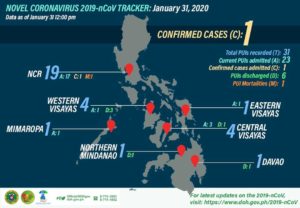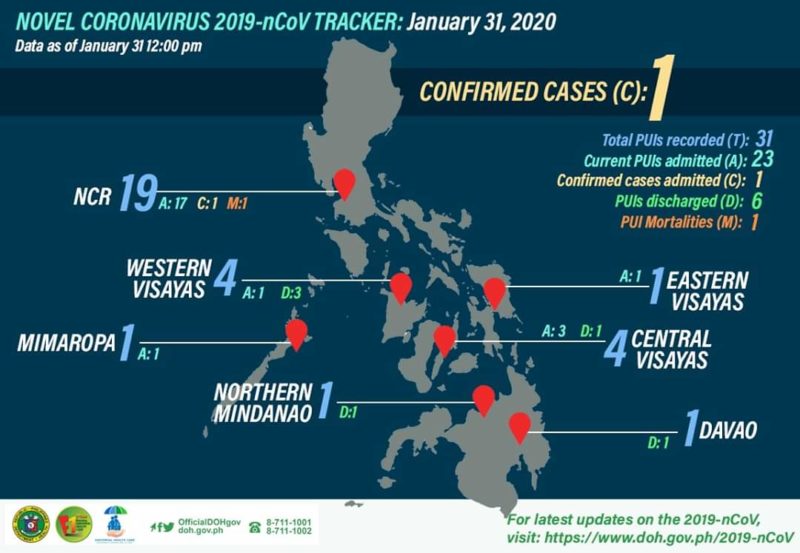 Safety measures have been tightened in the Philippines’ transportation hubs with the recording of the first confirmed case of the novel coronavirus (2019-nCoV) in the country, according to the Department of Transportation (DOTr).
Safety measures have been tightened in the Philippines’ transportation hubs with the recording of the first confirmed case of the novel coronavirus (2019-nCoV) in the country, according to the Department of Transportation (DOTr).
Transport Secretary Arthur Tugade said the transport department and its attached agencies have been implementing safety protocols at the country’s gateways as early as January 23, 2020, or just after China first reported the discovery of 2019-nCoV in the country, after the illness was first detected in December 2019 in Wuhan City in Hubei province.
READ: PH transport agencies on high alert vs coronavirus entry at ports
“We have adopted measures we deem necessary to secure our transportation hubs even before the first case was recorded in the country. This development will further strengthen our resolve to reinforce our safety measures and protocols in various transport terminals, in coordination with other concerned government agencies,” Tugade said in a statement.
DOTr is closely coordinating with the Department of Health (DOH) and Bureau of Quarantine (BOQ) to support the transport agency’s efforts to secure transport terminals from the 2019-nCoV and closely monitor arriving passengers.
For its part, the Civil Aviation Authority of the Philippines (CAAP) has reactivated its communicable disease preparedness procedures at all CAAP-operated airports, especially in international gateways such as Puerto Princesa, General Santos, Zamboanga, Davao, Kalibo, Laoag, and Iloilo in a bid to contain the spread into the country of 2019-nCoV.
Airport frontline personnel have been advised to observe precautionary measures such as maintaining proper hygiene, and regular hand washing, and to exercise extreme vigilance in handling passenger arrivals and strictly monitoring those who are possibly infected by the virus.
Posting of public advisories informing about coronavirus infections is also being enforced.
Air transport safety measures
For operations at the country’s main gateway, Manila International Airport Authority (MIAA) general manager Ed Monreal said they are in full coordination with BOQ in supporting safety protocols.
A dedicated lane with writing desks at the arrival concourse for quarantine thermal screening of arriving passengers has also been set up.
On January 23, 2020, the Civil Aviation Board (CAB) resolved to suspend immediately and indefinitely all air services operations between Wuhan and any point in the Philippines. Kalibo in Aklan is the only point in the Philippines that directly connects to Wuhan by way of chartered flights.
All air carriers, regardless of route serviced and as long as the origin or destination is in China, are also required to closely monitor the events that might transpire in other Chinese cities as well as other countries, and to take all precautions to ensure the protection of health and safety of passengers.
CAB likewise directed all pertinent air carriers to immediately secure from BOQ copies of the Health Declaration Checklist and ensure that all passengers and air crew answer it prior to disembarkation.
CAB stressed the importance of the checklist in assisting BOQ in tracking down passengers later on shown to be infected by or exposed to 2019-nCoV.
All area centers and airports, especially those with international flights, are ordered to immediately review and update their respective airport emergency plans to address public health threats such as 2019-nCoV in coordination with the local quarantine health office.
Local carriers Cebu Pacific and Philippine Airlines (PAL) have made adjustments to their flights into China, Hong Kong, and Macau in response to the outbreak of 2019-nCoV.
Cebu Pacific, in an advisory on January 30, said it will reduce flights between the Philippines, mainland China, Hong Kong and Macau from February 5 to March 29, 2020.
PAL has also adjusted its mainland China operations, according to an advisory on January 30. Charter flights between Kalibo and parts of China (Nanjing/Hangzhou/Pudong Shanghai) have been suspended, as the Chinese authorities have implemented precautionary measures to restrict outbound tourist travel from mainland China.
Scheduled flights between Manila and Beijing, Pudong Shanghai, Guangzhou, Jinjiang, Xiamen, Hong Kong and Macau, however, are still maintained. Advisories will be issued if there are any changes based on PAL’s daily assessment of the situation and the slowdown in travel from China.
Both airlines said they are also working closely with DOH and BOQ on the necessary actions after the identification of the 38-year old Chinese female passenger confirmed to be positive with 2019-NCoV who took their flights last January 21 and 25, 2020.
Both airlines are contacting passengers seated in the vicinity of the positive nCoV patient and are taking the necessary precautions to inform them so they can have themselves checked in case they show flu-like symptoms.
Cebu Pacific’s cabin crew and pilots on affected flights have also been informed and show no symptoms of illness, while PAL’s flight crew were placed on quarantine.
Meanwhile, the aircrafts used for Cebu Pacific’s flights have been pulled-out of the line and are undergoing thorough disinfection.
Maritime precautions against coronavirus
In the maritime sector, all ports operated by Philippine Ports Authority (PPA) are being directed to coordinate with quarantine offices and implement strict passenger screening at arrival areas. According to PPA general manager Atty. Jay Daniel Santiago, stringent security measures are also in place especially in areas frequently visited by tourists such as Bohol and Caticlan in Aklan. Face masks and sanitizers were likewise distributed to frontline employees.
READ: PPA needs more scanners as stricter measures employed across PH ports
The Philippine Coast Guard has advised all medical units in its 13 districts to be on high alert to block the possible spread of suspected coronavirus.
The Maritime Industry Authority has also issued an advisory enjoining all domestic ship owners, operators, and other stakeholders to take the “highest precautionary vigilance and cooperation to prevent, monitor, and report cases of nCoV.”
Strict passenger screening and safety measures are also in place at the country’s land terminals and railway networks to prevent the entry and spread of the virus.
Masks for PUV drivers, conductors
Meanwhile, the Land Transportation Franchising and Regulatory Board has issued Memorandum Circular (MC) 2020-005 mandating all public utility vehicle drivers and conductors to properly wear face masks at all times while on duty and for all franchise holders to ensure compliance. All terminal operators are likewise directed to ensure proper sanitation and cleanliness in their premises by providing face masks as well as disinfectants or sanitizers for the free use of passengers.
For its part, the DOTr railways sector has instructed all frontline station and security personnel of railway lines to wear appropriate face masks and to ensure that hand sanitizers and soaps are available for use in restrooms and other strategic areas inside stations.
Train interiors and station premises, particularly frequently touched surfaces exposed to the public, were likewise ordered disinfected.
Periodic reminders of preventive actions that can help prevent transmission of the virus were also directed to be posted in strategic locations.
“As we implement preventive measures and stringent monitoring of passengers in our transportation hubs nationwide, we implore the public to cooperate with the authority and also be vigilant in their travels at all times,” Tugade said.
The Subic Bay Metropolitan Authority (SBMA) has also placed on heightened alert status the sea ports and airport in the Subic Bay Freeport Zone as part of measures to contain the spread of 2019-nCov.
SBMA said no cruise ships will also dock in Subic in the next two months following the spread of 2019-nCoV, as cruise liners have already cancelled their trips.
As this developed, the Cebu Port Authority (CPA) is planning to purchase at least 16 thermal scanners for all the ports in Cebu to detect passengers showing signs of 2019-nCoV infection. Thermal scanners are already working at Mactan-Cebu International Airport.
The Davao City Health Office is also closely coordinating with BOQ to step up screening of people coming to the city from all points, especially from Davao international Airport, which receives daily domestic flights and international flights from Hong Kong, Singapore, Manado and Quanzhou. The airport is already equipped with thermal scanners.
The Bureau of Customs, meanwhile, is closely working with the Department of Agriculture and DOH in monitoring and inspecting shipments coming from countries with reported cases of 2019-nCoV infection to prevent the possible entry of non-human carriers of the disease into the Philippines.
READ: BOC, DA, DOH monitor cargoes from countries with cases of coronavirus
The World Health Organization has declared the 2019-nCoV outbreak a public health emergency of international concern. Also known as the Wuhan coronavirus, 2019-nCoV is a contagious virus that causes respiratory infection and has been shown capable of human-to-human transmission.
More than 200 deaths due to the virus have been recorded globally as of January 31 even as the microbe continues to infect thousands. In the Philippines, one positive case has been declared on January 30 while several others in different areas are being monitored.
Updated on Feb 1, 3:15pm, to reflect statement of Trade Secretary.





